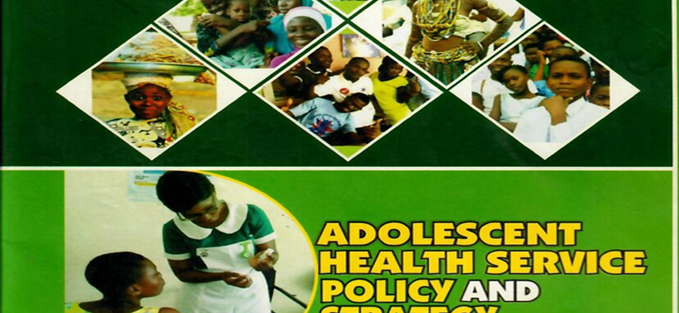As the global adolescent population (ages 10-19) continues to grow, currently at 1.3 billion, their health has become a key priority for governments worldwide. In response to this growing focus and in alignment with global initiatives such as the Sustainable Development Goals (SDGs), the Ghana Health Service launched the National Adolescent Health Policy and Strategy (2016-2020) in 2016. The policy provided a comprehensive framework for addressing the diverse health needs of Ghana’s 6.9 million adolescents, who represent about 22% of the total population. The policy targeted critical areas like mental health, sexual and reproductive health (SRH), and youth-friendly services while emphasizing cross-sector collaboration and active adolescent engagement in tailored interventions. Additionally, the policy prioritized enhanced training for health providers and media campaigns to ensure better access to quality services and informed decision-making among adolescents.
Despite its ambitious goals, the policy’s implementation encountered major challenges. A review by Agblevor et al. (2023) found that only 17% of the policy strategies were fully executed, 57% were partially implemented and 26% were not executed. This limited progress has left many adolescents without adequate health support, significantly undermining the policy’s overall impact. The data and insight in this blog are drawn from the article “We have nice policies but…” Implementation Gaps in the Ghana Adolescent Health Service Policy and Strategy (2016–2020), which provides an in-depth analysis of the gaps and the contextual factors that affected the policy’s implementation.
Implementation Gaps: Where it fell short
A major obstacle to the policy’s full implementation was insufficient funding. While the Government of Ghana is the primary financier of the health sector, the Ghana Health Service relies heavily on external donors for adolescent health initiatives. This reliance created an unsustainable model, where programmes could not be sustained beyond short-term funding cycles. A prime example is the popular You Only Live Once (YOLO) TV show, which provided critical SRH education to young people. Despite its success, the show was discontinued when funding from the UK’s Department for International Development (DFID) ended. YOLO returned to television in 2023 after a three-year hiatus, but only with new funding support from USAID. This situation highlights the challenges of donor dependency and the urgent need for Ghana to rethink its health financing strategy, especially as external support declines – following the country’s reclassification as a middle-income nation.
Additionally, structural barriers within Ghana’s political and legal systems impeded implementation. Inconsistencies between laws, such as the age of sexual consent set at 16 in the Criminal Offences Act 1960 and the legal age of adulthood at 18 in the Children’s Act 1998, created confusion in efforts to prevent teenage pregnancy and child marriage. As well, the Criminal Offences Act 1970, which criminalized attempted suicide, conflicted with the Mental Health Act 2012, which supports individuals with suicidal behavior. While recent advocacy efforts led to the decriminalization of attempted suicide, such legislative inconsistencies have complicated program implementation.
Entrenched socio-cultural norms around SRH also fueled strong resistance to the policy’s implementation. In many parts of Ghana, discussions about sex remain taboo, resulting in stigma for adolescents seeking SRH services. Myths and misconceptions surrounding contraceptive use further deter young people from accessing family planning, leading to high rates of unintended pregnancies and sexually transmitted infections. Efforts to introduce a Comprehensive Sexuality Education (CSE) programme faced significant opposition, particularly from religious and cultural groups who viewed it as promoting immorality and LGBTQ+ ideologies. As a result, the CSE programme was only partially implemented, often in silos, without a cohesive national rollout. A revised version, rebranded as Reproductive Health Education was later developed but has since stalled limiting adolescents’ access to essential SRH information.
The neglect of adolescent mental health services was another critical gap. Evidence shows that 75% of mental health conditions manifest during adolescence, yet mental health services were poorly integrated into primary healthcare services. The shortage of trained mental health professionals, especially at the community level, and the fragmented approach to service delivery left many adolescents without the support they needed. Mental health services often operated in silos, separate from SRH and other health interventions, reducing their overall impact.
Another critical shortfall was the limited engagement of adolescents in both the planning and execution of the policy. This top-down approach often neglects the unique perspectives and needs of the target population, resulting in less effective interventions that are not fully aligned with the realities of adolescents’ lives. A final gap in the policy’s implementation was the absence of robust monitoring and evaluation mechanisms essential for tracking progress and outcomes. Without these systems, it was difficult to identify areas needing improvement and make data-driven decisions.
Missed Opportunities and Lessons Learned
The failure to fully implement the Adolescent Health Service Policy and Strategy was a missed opportunity to make lasting improvements in the lives of young Ghanaians. Yet, the policy showed potential when initiatives were adequately supported. An example is the YOLO programme, and the introduction of e-learning platforms for health workers. However, the sustainability of these initiatives remains a concern due to the heavy reliance on external funding and the lack of long-term financial planning.
As Ghana looks ahead, addressing these implementation gaps is important for safeguarding the health and well-being of its adolescent population. The path forward requires prioritizing long-term domestic investment to ensure that critical health programmes can continue sustainably without relying on fluctuating external funding cycles. There is also a need for robust monitoring and evaluation mechanisms; and a legal framework that addresses inconsistencies around sexual consent and child marriage. More importantly, community involvement and adolescent engagement are key to overcoming cultural barriers and ensuring that health services align with the needs of young people.
This article draws on the original article titled “We Have Nice Policies But… Implementation Gaps in the Ghana Adolescent Health Service Policy and Strategy (2016–2020).” The study is part of a broader initiative aimed at promoting gender-responsive and transformative health systems for adolescent mental health and sexual and reproductive health in Ghana, Niger, and Burkina Faso, under the Adolescent West Africa (ADOWA) Project. The ADOWA initiative comprises two main components: AdoWA-GTR, which focuses on gender-transformative health systems, and AdoWA-REP, which emphasizes responsive and efficient primary care for adolescents. This collaborative project is funded by the International Development Research Centre (IDRC) under Grant No. 109808 (AdoWA-GTR) and the UK Medical Research Council (MRC) under Grant No. MR/T040203/1 (AdoWA-REP).



